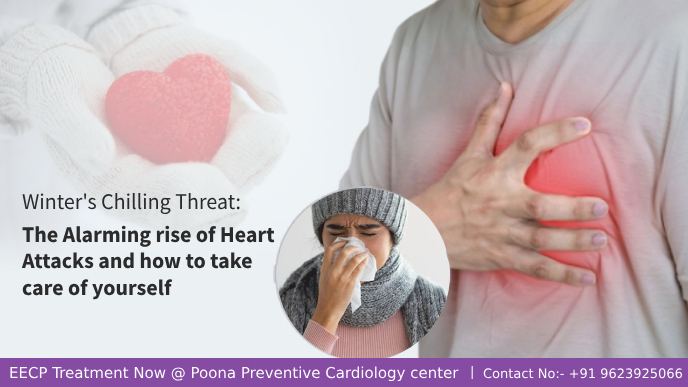
As winter’s chill sets in, it brings with it a dark undercurrent. The cold weather does not just nip at your nose but carves a path down to your heart, increasing the risk of heart attacks. The cause? As the temperature drops, your blood vessels constrict, leading to elevated blood pressure and exerting additional stress on your heart.
This phenomenon is not new, and yet it still takes many by surprise every year. But here’s the truth: We can guard ourselves against this threat. As the old saying goes, prevention is better than cure, and this is particularly true in the case of heart health. At the forefront of this preventive approach is the Poona Preventive Cardiology Centre (PPCC), providing a beacon of hope to those living under the shadow of potential cardiovascular complications.
Understanding the link between cold weather and heart attacks
The correlation between cold weather and heart attacks is not just anecdotal but scientifically proven. The chilling temperatures cause our blood vessels to contract, leading to increased blood pressure. This, in turn, puts additional strain on the heart, raising the chances of a heart attack.
Certain groups are at a higher risk during this period. Elderly people, hypertensive and diabetic patients, individuals with pre-existing cardiovascular conditions, and those with a family history of heart disease must be particularly vigilant. Moreover, the winter months often see a decrease in physical activity and an increase in stress levels, both of which exacerbate the situation.
Preventing a heart attack isn’t about avoiding the cold. It’s about understanding the risks, staying aware of our health, and taking the necessary measures to keep our hearts beating strong.
Early detection and prevention
Early detection can be a life-saver when it comes to cardiovascular health. Regular check-ups can spot potential issues before they escalate into major health concerns. At PPCC, we believe in:
1. Regular Check-ups: These can identify potential risk factors and ensure that any existing conditions are managed effectively.
2. Risk Factor Identification: By knowing your risk factors, you can take steps to mitigate them.
3. Preventive Measures: From lifestyle changes to medication, there are many ways to reduce your risk of heart disease.
4. Patient Empowerment: We want to empower patients with the knowledge and tools they need to take control of their health.
5. Preventive Treatment: At PPCC, we’re proud to offer a range of preventive treatments to our patients.
Features of Preventive Heart Disease Treatment
Root Cause
At PPCC, we don’t just treat the symptoms; we address the root cause of the disease. Our primary goal is to help patients lead a long and healthy life through effective treatment and preventive care.
Quality of Life
We strive to improve the quality of life for our patients by making the heart’s blood pumping work more efficient and effortless.
Hypertension and Diabetes Control
Hypertension and diabetes are major risk factors for heart disease. We work with patients to control these conditions and reduce their cardiovascular risk.
Avoiding surgeries
Our preventive treatments offer an alternative to invasive surgeries like angioplasty and bypass surgery.
Preventive Treatments by PPCC
Preventive treatment is not just about tackling the symptoms as they appear; it’s about preemptively addressing the underlying issues. For the past fifteen years,PoonaPreventive Cardiology Center, a leader in preventive and alternative treatments, has provided relief to thousands of patients through treatments like EECP, ESMR, ACT.
The treatments have proven effective for patients who do not wish to undergo angioplasty or bypass surgery, and also for those who have undergone bypass surgery but still experience symptoms such as breathlessness and chest pain (angina). This comprehensive treatment plan not only addresses the immediate issues but also works to prevent future heart attacks.
This approach makes a significant difference in the patient’s health and quality of life. We’ve seen time and again how implementing these preventive measures leads to fewer hospital visits and a healthier, more active lifestyle.
Nutrition and lifestyle changes for heart health
A heart-healthy diet, coupled with regular exercise, can do wonders for your cardiac health. Avoiding processed foods and incorporating more fruits and vegetables can make a significant difference. Additionally, managing stress levels through mindfulness, yoga, or other relaxation techniques can help keep your heart happy and healthy.
Testimonials from patients
Hearing the success stories of patients at PPCC is both heartening and inspiring. Their journey from the precipice of uncertainty to the pinnacle of good health is a testament to the effectiveness of our preventive treatments. These stories provide the power and inspiration for new patients to embark on their journey towards a healthier future.
Conclusion
In conclusion, winter carries a chilling threat to our heart health, but with awareness and preventive measures, we can shield ourselves from this icy danger. Taking care of your heart health is not just a winter precaution but a lifelong commitment.So stay vigilant and remember, at PPCC, we’re always here to help you keep your heart beating strong.
Please note: For any health-related concerns, always consult with a qualified healthcare professional. The contents of this blog are for informational purposes only and should not be used as a substitute for professional medical advice, diagnosis or treatment.


